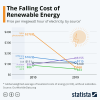Fryowa
Administrator
Again I think you and I agree on 99% of the conceptual ideas.Secondarily, I agree nuclear is crucial, and if we hadn't demonized it 40 years ago, we would be in a lot better place now. I also think EVs are a part of the solution. If your car can only be powered by 1 thing (gas), that is not nearly as good as if it can be powered by many things (natural gas, coal, solar, wind, nuclear, the next new thing that hasn't been invented yet).
If we could all of a sudden change our power over to nuclear in the world almost all our relevant problems would be doneski. Seriously. It's almost zero emissions other than some heat, and we can bury the waste under mountains for the next thousand years and not even make the tiniest dent in the ecology of the world.
EVs is a topic I like to read about for a lot of reasons. I used to work in the electrical distribution field which I think helps me see the big picture. They're a quaint and novel idea, but they don't even put a drop in a ten gallon bucket to emissions. Plants generating electricity are what's causing emission problems.
Let's even say we could snap our fingers and all our power plants were magically nuclear or wind/hydro generated. Great...now we solved the electricity problem and we can make all EVs, right? Nope. Not even close. We have no way to get electricity to those vehicles because our distribution network in this country was designed in the 1950s for 1950s loads. If we even turned 10% of the nation's current gas/diesel vehicles to EV it would instantly cripple the entire country's power grid and it would cost tens of trillions to upgrade and many many decades to do it.
People can go ahead and make a token statement by buying an EV and saying at least they're doing their part, but it's really just show. They electricity they're using is coming mostly from coal burning. Windmills create the same amount of emissions per unit from raw material to installation/construction than they generate in their useful service lives. It's all really just show until we can get to nuclear power. Maybe in 4 or 5 generations we can get there.
EVs are a good thought and made with good intent. But they aren't helping the real problem and just serve as a somewhat disingenuous guilt-reducer to wealthy people who can afford them. The same wealthier demographic that is many hundreds of times more likely to fly in an airplane for work or pleasure multiple times a year burning kerosene and have a 3,000 square foot house using 1,600 kW/H a month. It ain't the guy driving an '07 Acadia to work at Foot Locker every day.

